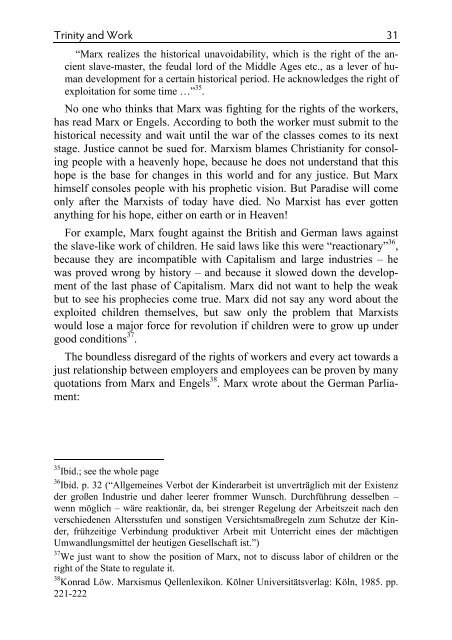Love is the Fulfillment of Law - World Evangelical Alliance
Love is the Fulfillment of Law - World Evangelical Alliance
Love is the Fulfillment of Law - World Evangelical Alliance
You also want an ePaper? Increase the reach of your titles
YUMPU automatically turns print PDFs into web optimized ePapers that Google loves.
Trinity and Work 31<br />
“Marx realizes <strong>the</strong> h<strong>is</strong>torical unavoidability, which <strong>is</strong> <strong>the</strong> right <strong>of</strong> <strong>the</strong> ancient<br />
slave-master, <strong>the</strong> feudal lord <strong>of</strong> <strong>the</strong> Middle Ages etc., as a lever <strong>of</strong> human<br />
development for a certain h<strong>is</strong>torical period. He acknowledges <strong>the</strong> right <strong>of</strong><br />
exploitation for some time …” 35 .<br />
No one who thinks that Marx was fighting for <strong>the</strong> rights <strong>of</strong> <strong>the</strong> workers,<br />
has read Marx or Engels. According to both <strong>the</strong> worker must submit to <strong>the</strong><br />
h<strong>is</strong>torical necessity and wait until <strong>the</strong> war <strong>of</strong> <strong>the</strong> classes comes to its next<br />
stage. Justice cannot be sued for. Marx<strong>is</strong>m blames Chr<strong>is</strong>tianity for consoling<br />
people with a heavenly hope, because he does not understand that th<strong>is</strong><br />
hope <strong>is</strong> <strong>the</strong> base for changes in th<strong>is</strong> world and for any justice. But Marx<br />
himself consoles people with h<strong>is</strong> prophetic v<strong>is</strong>ion. But Parad<strong>is</strong>e will come<br />
only after <strong>the</strong> Marx<strong>is</strong>ts <strong>of</strong> today have died. No Marx<strong>is</strong>t has ever gotten<br />
anything for h<strong>is</strong> hope, ei<strong>the</strong>r on earth or in Heaven!<br />
For example, Marx fought against <strong>the</strong> Brit<strong>is</strong>h and German laws against<br />
<strong>the</strong> slave-like work <strong>of</strong> children. He said laws like th<strong>is</strong> were “reactionary” 36 ,<br />
because <strong>the</strong>y are incompatible with Capital<strong>is</strong>m and large industries – he<br />
was proved wrong by h<strong>is</strong>tory – and because it slowed down <strong>the</strong> development<br />
<strong>of</strong> <strong>the</strong> last phase <strong>of</strong> Capital<strong>is</strong>m. Marx did not want to help <strong>the</strong> weak<br />
but to see h<strong>is</strong> prophecies come true. Marx did not say any word about <strong>the</strong><br />
exploited children <strong>the</strong>mselves, but saw only <strong>the</strong> problem that Marx<strong>is</strong>ts<br />
would lose a major force for revolution if children were to grow up under<br />
good conditions 37 .<br />
The boundless d<strong>is</strong>regard <strong>of</strong> <strong>the</strong> rights <strong>of</strong> workers and every act towards a<br />
just relationship between employers and employees can be proven by many<br />
quotations from Marx and Engels 38 . Marx wrote about <strong>the</strong> German Parliament:<br />
35<br />
Ibid.; see <strong>the</strong> whole page<br />
36<br />
Ibid. p. 32 (“Allgemeines Verbot der Kinderarbeit <strong>is</strong>t unverträglich mit der Ex<strong>is</strong>tenz<br />
der großen Industrie und daher leerer frommer Wunsch. Durchführung desselben –<br />
wenn möglich – wäre reaktionär, da, bei strenger Regelung der Arbeitszeit nach den<br />
verschiedenen Altersstufen und sonstigen Versichtsmaßregeln zum Schutze der Kinder,<br />
frühzeitige Verbindung produktiver Arbeit mit Unterricht eines der mächtigen<br />
Umwandlungsmittel der heutigen Gesellschaft <strong>is</strong>t.”)<br />
37<br />
We just want to show <strong>the</strong> position <strong>of</strong> Marx, not to d<strong>is</strong>cuss labor <strong>of</strong> children or <strong>the</strong><br />
right <strong>of</strong> <strong>the</strong> State to regulate it.<br />
38<br />
Konrad Löw. Marx<strong>is</strong>mus Qellenlexikon. Kölner Universitätsverlag: Köln, 1985. pp.<br />
221-222

















